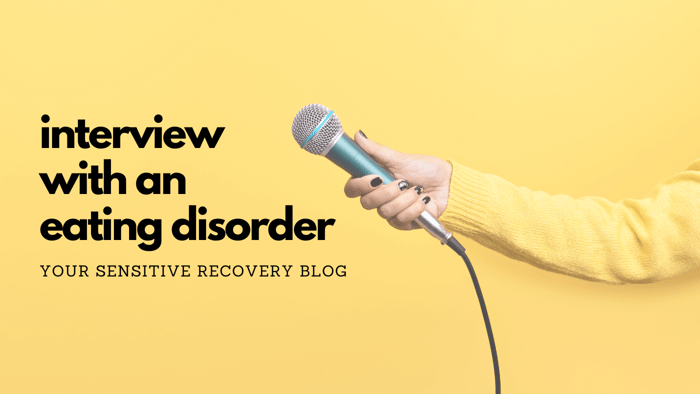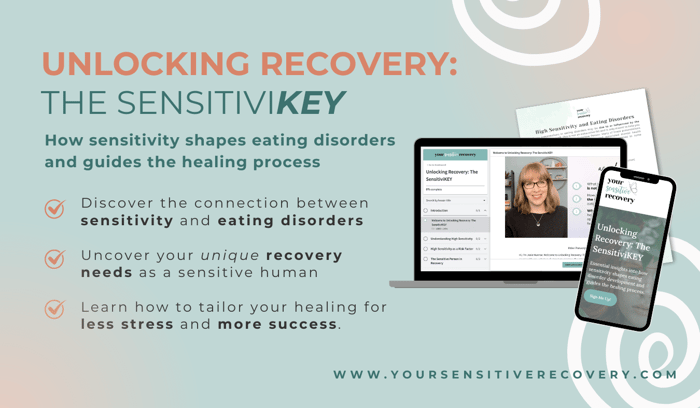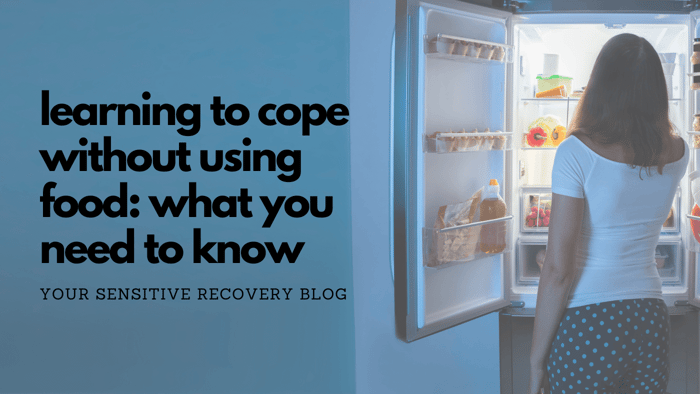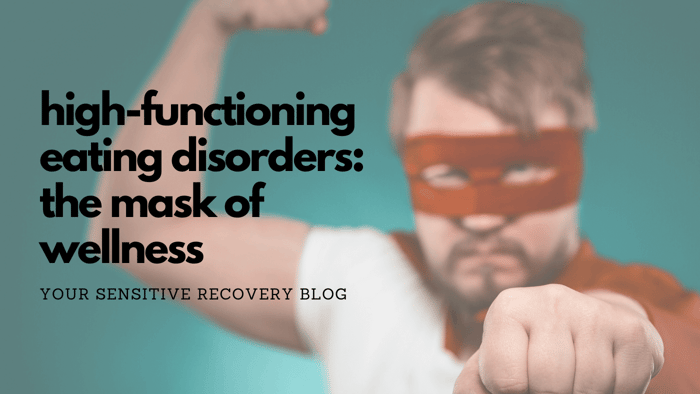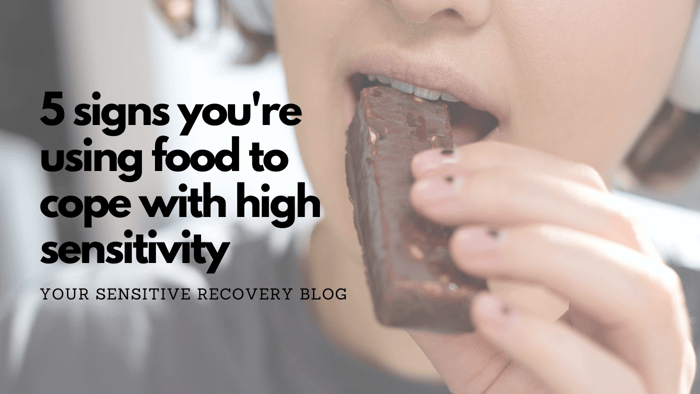Today, I’m sitting down with someone familiar to many of our readers, but rarely understood; Eating Disorder. Though often viewed as the enemy, Eating Disorder does indeed have a voice, a purpose, and a story that shouldn't be ignored, and they're willing to tell it now, on the record.
In this conversation, we touch on the roots of Eating Disorder's influence, their skills and jobs, and how they inadvertently took over. Through this dialogue, Eating Disorder and I hope to shed light on why these disorders develop and, more importantly, how we can move toward healing by listening and understanding.
(In this post, I use language from a therapeutic approach called Internal Family Systems. This framework is based on the premise that each person is made up of different "parts," which serve different purposes. Using "we" in this post refers to all the parts of a self that develop in response to different stimuli, including pain, stress, and trauma. Through this lens, the eating disorder is considered its own "part.")
"I never intended for things to go where they did."Interviewer: "So, tell me. Obviously, this is a big deal for you. You've never really been one to use words to share your story. You've mostly spoken through actions. What is this like for you right now, to be given a voice?"
Eating Disorder: "That's correct. Well, it's always been challenging for me to verbalize what's happening. I don't know...I feel quite nervous now. I actually can't stand taking center stage. That's something the media has misrepresented about me for ages. I know that many people believe I'm just looking for attention, but I would always rather fly under the radar."
Interviewer: "But, even if you were looking for attention, what's so wrong about that?"
Eating Disorder: "My thoughts exactly! If my existence were simply a bid for attention, it would signal that we felt very much incapable of receiving attention in other, healthier ways. That really points the finger at a larger problem within the system, you know?"
Interviewer: "That's so true. So what would you say it is about for you?"
Eating Disorder: "Gosh...so much. You know, I began as one thing, and over time I just took on more and more tasks. It's pretty difficult to pinpoint the beginning. I never intended for things to go where they did. At first, it was simply a way for us to feel a little more in control. I remember when I came around there had been several incredibly difficult experiences happening. It seems everyone felt rather shaken and unsure of how to move forward. I thought I could help."
Interviewer: "And did you?"
Eating Disorder: "Certainly! Especially at first. Nobody else could evoke the sense of calm that I was able to bring to us. I not only numbed the pain of those experiences we were facing, but I quieted the general anxiety we'd wrestled with for years. I narrowed the world down to one simple focus. That felt like a relief."
"I got too good at my job, in all honesty."Interviewer: "As I understand it, other people became pretty upset at you and blamed you for quite a lot of pain."
Eating Disorder: "Yes...well, I got too good at doing my job, in all honesty."
Interviewer: "Say more about that. What is it you thought your job was?"
Eating Disorder: "This might be hard to articulate but I'll give you some examples. We felt empty inside. I filled a very real void. The rules and the goals I created gave us a sense of purpose that was unmatched. We've always been a bit of a perfectionist, and it just so happened that this was something we felt really good at. I kept us company during a lonely time. And for a long while, we got a good deal of praise and validation for being so disciplined. Also, I figured out how to communicate things that were just too hard to come out and say."
Interviewer: "Like what?"
Eating Disorder: "I'm cautious right now about other parts of us feeling betrayed by this...but...for one thing, me sticking around made it clear to other people that we were not ok; that we couldn't handle all the responsibilities that had been placed on us, or that we believed had been. And, well...we didn't know how to say things like that we were angry. Very, very angry. With me, and I don't like to admit this...it almost seemed we could punish other people for hurting us, even though I knew we were now the ones suffering the most. "
"We were just so scared of failing."Interviewer: "It's making sense now just how important your role was. And when it became clear that you were creating suffering in your attempts to alleviate it, why didn't you just back off?"
Eating Disorder: "We were scared. I was really strong at this point, so much so that the rest of us had become very, very quiet and small. To be honest with you, there were times that I truly forgot the rest of us existed. I became our whole identity. That felt good in a way, but it also embarrassed us, immensely. There were times when I thought we needed help, and that someone else should step up and take over. I tried a few times to let that happen. We were just so scared of failing. Truthfully, it felt safer not to try. I wasn't happy being the leader anymore, but I didn't know how to give up that role either. And I was afraid that if I did, we'd be worse off. My goals for us got so out of control and nothing we did ever felt good enough like it once had. We were truly miserable and I felt so powerless to change it. I kept telling us that I was here and it was ok...that I could take care of us...but..."
Interviewer: "I know this is bringing up a lot of emotion for you. Can I just reflect something to you? I am so moved by just how much you truly cared about everyone. You tried really hard to make everything bearable...and it all backfired."
Eating Disorder: "Thank you. That's exactly what I'm trying to say. I felt so ashamed about it for so long."
Interviewer: "And now?"
Eating Disorder: "Maybe you've gathered from this discussion that I'm no longer at the head of the table. I wouldn't have been able to be this open and vulnerable with you now if I were."
"Our stories are so important."Interviewer: "How were you able to surrender?"
Eating Disorder: "It was a different approach someone took with us. We were presented with the idea that I was not the enemy. I was not someone to be obliterated, but rather...integrated. Healed. When we began to understand this new perspective, something clicked. I knew that I could step down and that we would be ok...and through that, I actually became ok. I'm still here, but I'm changed. I can confidently say that I'm not ever going to take the reigns again. I don't need to or want to. Too much healing has happened to go back."
Interviewer: "You're not afraid that you'll make a grab for the reigns in the future?"
Eating Disorder: "No. I'm not. And the rest of us aren't afraid either. That probably makes the biggest difference. We considered ourselves fully recovered from that chapter. We're all really gentle with each other now. We ask each other what we need, and we listen. We're all a great team today. I feel truly cared for, but in a way that makes us strong, healthy, and balanced, as a unit...as one."
Interviewer: "And we'll end on that, Eating Disorder. Thank you so much for your time and your truth today."
Eating Disorder: "Thank you for taking the time to listen. Our stories are so important. I want everyone to know that, and to know that you're not alone. Not ever."
✨ Josie Munroe, LMFT is a licensed therapist and owner of JosieMunroe.com and Your Sensitive Recovery. As a recovered clinician and Highly Sensitive Person, she loves supporting others on their journeys to form new, empowered relationships with food, their bodies, and their sensitivity. Join the newsletter for a weekly boost of hope and inspiration. You deserve a recovery that works for you! ✨

